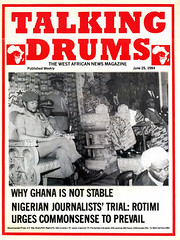Ashanti Destoolment Case Takes Dramatic Turn
From Our Palace Correspondent, Kumasi
The destoolment of Nana Kwantwi Barima II as the Adansihene by Otumfuo Opoku Ware II, the Asanttehene, has taken a dramatic turn.
The destooled Chief ignored the pleas of his Kumasi-based lawyer, Mr. Appiah-Menka, and rushed to Accra to engage new lawyers to fight out the destoolment case with the Asantehene.
Professor Ofosu-Amaah, a prominent Accra legal practitioner is leading a team comprising Kwaku Baah, a former leader of the Popular Front Party Opposition in the Third Republic Parliament, to defend the Adansihene. Otumfo Opoku Ware II is being represented by Messrs. Torto, Kofi Sackey and J. K. Agyeman.
The Asantehene had his first shock when Professor Ofosu-Amaah and Kwaku Baah obtained an Accra High Court injunction order to restrain him and his representatives or agents from carrying out the destoolment of the Adansihene.
The main legal issue is whether or not the Asantehene has power to destool a chief. According to the Adansihene, he was nominated by the Queen-mother of Adansiman and elected and installed by the chiefs, elders and people of Adansi Traditional Area. He says it was not the Asantehene who enstooled him and therefore had no power to destool him. He is asking the court to declare the purported destoolment null and void.
The Asantehene also argues that the whole process of enstoolment is not complete until he (Asantehene) administers the oath of allegiance. The Asantehene explains that if a person is nominated and installed as a chief, he cannot perform the functions of a chief unless he has sworn the oath of allegiance to a superior chief if the newly elected is a sub-chief.,
The Asantehene further says the moment he withdraws his recognition from any chief, that chief automatically ceases to function as a chief. All matters related to chieftaincy are governed by the Chieftaincy Act of 1970 (Act 370). In the Act, the position of the Asantehene is given a special status and recognition. The Act begins thus:
"There shall be the Asantehene and chiefs of Ghana."
This special position of the Asantehene is in recognition of the fact that he is the only chief in Ghana who has under him some 25 paramount chiefs in Ashanti Region and about 6 paramount chiefs in the Ahafo part of the Brong-Ahafo Region.
But what perhaps the Adansihene is saying is that the Chieftaincy Act also prescribes ways of destooling a chief. Nowhere in the Act is the Asantehene empowered to destool a chief.
What the Asantehene should have done was to announce publicly, his withdrawal of customary recognition from the Adansihene and then inform the chiefs, elders and people of Adansi that he could no longer sit in state with the Adansihene because of the latter's display of gross insubordination. The people of Adansi would then destool their chief in accordance with the mode of destoolment as contained in the Chieftaincy Act.
The case, The Adansihene v. The Asantehene, has generated a lot of public interest. It is surely going to be a test case and would no doubt drag on for months considering the fact that any party that would be declared losers is likely to go to Appeal Court.
Those who support the Asantehene say if the great chief of Ashanti cannot destool his subordinate chief then what justification has he for continuing to occupy the legendary golden stool of Ashanti.
The supporters further argue that the whole process of destoolment was purely customary. It took place at the Manhyia Palace. It was not a judicial action so the Adansihene has no grounds to resort to legal action to seek redress (if any).
There are a number of prominent Ashantis, including politician-lawyers like Victor Owusu and Joe Appiah who are "sitting on the fence" as far as this case goes. It is being said in certain quarters that the present Asantehene has not proved himself as "powerful" as his predecessors hence the lukewarm attitude many prominent Ashantis have adopted about the case.
Fifth anniversary celebrations
Ghana's newspapers have been celebrating the fifth anniversary of "15 May" and "4 June". The first date, 15 May, 1979 was the day on which Flt-Lt. Rawlings made his abortive attempt at seizing power which ended in his being arraigned before a court martial with six other ranks. Pictures of the trial which also proved abortive were published in the papers commemorating the entry of the Leader of the Revolution on the Ghanaian political scene.Actually, the Flight Lieutenant had appeared on the front page of the Daily Graphic a week before 15 May he was pictured leading the then Head of State, Lt-Gen. F.K. Akuffo to inspect a guard of honour Kotoka International Airport.
The second date 4 June was the day the ranks of the Ghana Armed Forces mutinied and released Flt-Lt. Rawlings from custody where he was kept during the trial. An Armed Forces Revolutionary Council was formed with Flt-Lt. Rawlings as its head and Major (then Captain) Boakye-Djan as its spokesman.
On 16 June, Mr Kutu Acheampong and Maj-Gen. E.K. Utuka were executed by firing squad at the Teshie firing range the details were recorded by newspaper and television cameramen for the public.
On 18 June, the scheduled general elections took place with the PNP emerging as the winner of majority seats in Parliament. The two leading Presidential contenders Dr Hilla at the Limann of the PNP and Victor Owusu of the PFP were scheduled to face each other in a subsequent one on 8 July.
On Tuesday 26 June, 1979, six more senior members of the Armed Forces, members of the ruling SMC Government were executed by firing squad: Lt-Gen. F.K. Akuffo, Maj Gen. R.E.A. Kotei, Rear-Admiral Joy Amedume, Air-Vice Marshal George Boakye, Col. R.J. Felli and Lt-Gen. (Rtd.) A.A. Afrifa. Lt-Gen. Afrifa had been elected on the ticket of the UNC, one of the parties to have contested the elections, to parliament by the Mampong North Constituency.
